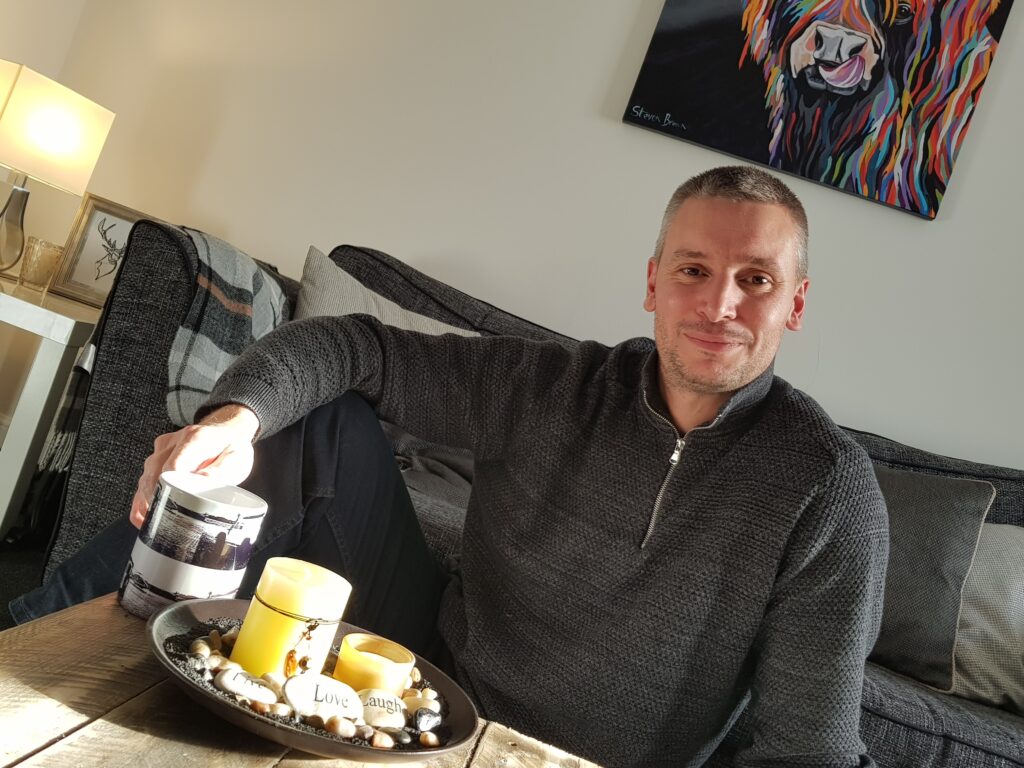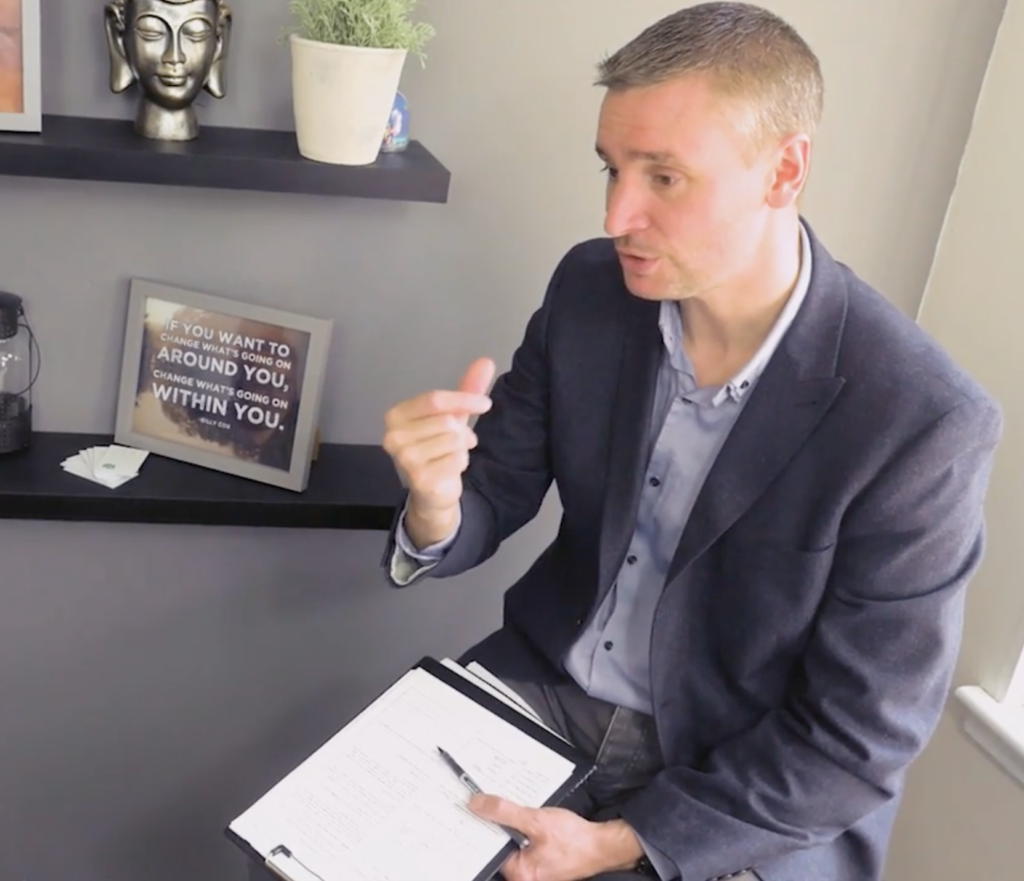Anxiety Therapy
Anxiety Therapy
Stop your excessive anxiety now! Begin a new life free from Anxiety.
“I’m so stressed out!” If you’re reading this right now, you might be interested in learning about anxiety therapy.
Anxiety is a common mental disorder that can affect people of all ages and backgrounds.
We will discuss some causes of anxiety, symptoms and treatments for the condition. And how I overcome my struggle with anxiety.
Are You Ready To Let Go of Your Anxiety
- Eliminate Anxiety
- Embrace Change
- Change Your Life
I created the Anxiety Unplugged programme based on everything I learnt during my personal battle with anxiety. I have been free from my anxiety habit for over 16 years now - and so can you!
Andy Griffiths

What Are Some Signs Of Anxiety?


What does it feel like to have an anxiety attack?
So, you’re sitting there and the anxiety attack comes out of nowhere. You don’t know what’s happening or why it’s happening but all you know is that this must be anxiety because anxiety has been building up inside of you for a while now.
You feel your heart pounding quickly in your chest as if you’re about to have a heart attack. Your anxiety might be so intense that you start shaking uncontrollably or crying for no reason at all.
You’re also feeling like the anxiety is in control of your body and mind, which makes it even more difficult to get a grip on what’s happening to you whilst experiencing an attack.
Anxiety attacks can also cause you to feel like you’re about to pass out or vomit, which is a common feeling for someone who has anxiety because it’s happening so suddenly and intensely that you have no time to adjust or regulate your breathing properly.
Another symptom is the feeling of being unable to escape from whatever it is that has caused your anxiety–whether it be a thought, situation, or person.
Find out how you can deal with them here: Panic Attacks And How To Treat Them
Why Do People Get Anxious?
Anxiety may have a biological cause, such as an imbalance between serotonin or another chemical that affects moods for example. It could also be caused by other factors like stress or underlying anxiety disorders.
People should be aware that feeling anxious is a common feeling and not something to worry about too much, as it can often go away by itself with time or some self-help techniques. Some people may experience anxiety more than others, but everyone experiences anxiety from time to time.
Anxiety isn’t always a bad thing. For example, anxiety can help people react quickly and think clearly during an emergency situation. Some anxiety is normal because anxiety pushes us to react quickly when we are faced with dangerous situations.
However, anxiety should never be ignored if the feeling persists for longer than expected or starts to take over your life. Anxiety usually goes away by itself but it may also benefit from some self-help techniques like deep breathing exercises and meditation.
If you notice a change in moods or behaviour then talk to a professional who will work with you on finding the right treatment plan for anxiety relief.
Anxiety often disappears after some time without any kind of intervention needed; however, there are many effective ways to treat anxiety naturally at home
If you have read my story you will understand that I had a long battle with anxiety. I tried everything to rid myself of anxiety including numerous visits to my GP, medication, counselling, breathing techniques and finally researching the condition and curing myself. My battle with anxiety inspired me to become a trained therapist who specialises in all anxiety conditions.
I created the Anxiety Unplugged programme based on everything I learnt during my personal battle with anxiety.
I have been free from my anxiety habit for 16 years now – and so can you!
Fundamentally there is nothing wrong with, you are not ill, you are not broken and more importantly, you are not dying.
Although the symptoms of anxiety are very real and very scary (I know….) what you are really experiencing is a bunch of sensations that in reality cannot harm you.
How Do I Know If I Suffer From Anxiety?
-
Have difficulty concentrating
-
Become irritable and/or suffer mood swings.
-
Experience chest pain and shortness of breath.
-
Have trouble sleeping or just feeling fatigued.
-
Feel increased anxiety the next day after a stressful event.
-
Hypersensitivity
-
Feel uncomfortable in social situations.
Anxiety is an emotional response to something in the environment, which can also be a physical reaction.
Anxiety is a mental illness that creates many different physical responses, such as sweating, shaking or nausea
Anxiety causes the body to produce increased amounts of adrenaline and cortisol which could affect digestion or even your blood pressure
It’s important for people with anxiety to know what their bodies are telling them so they can properly address anxiety.
Why do anxiety symptoms jump around?
Feeling anxious or experiencing anxiety symptoms may come and go. This is because anxiety can cause the body to become more sensitive, which makes people more prone to anxiety attacks
One reason for this fear response could be that anxiety stimulates a part of your brain called the amygdala.
The way it does so varies depending on what type of anxiety you have.
Generalized anxiety disorder (GAD) will activate the amygdala through thoughts about events in the future or worries over everyday tasks like grocery shopping or cooking dinner;
Panic disorder activates it with memories associated with past panic attacks.
The increased sensitivity leads some people suffering from GAD into a cycle where they feel anxious, then start worrying about their feelings of anxiety and becoming convinced that despite having no physical signs, something must be wrong with their health.
The anxiety symptoms can also be triggered by stress or a traumatic event, which causes the amygdala to become hypersensitive and react to things that don’t typically cause anxiety.
People who have experienced trauma may feel more anxious when they’re in certain situations, like crowded places or being near someone they’ve had trust issues with before.
This is because memories of past traumas are stored in our brains as if they were still happening; this means it’s much easier for them to come back up during times where we might already be feeling vulnerable.”

Is anxiety permanent?
No anxiety is not permanent.
If anxiety is left untreated or isn’t taken seriously, you may end up dealing with anxiety and the symptoms it causes for years without any relief in sight.
There are a variety of things that can causes anxiety but there are a few things that people have found to cause more intense anxiety like sleep deprivation, stress at work, school, feeling overloaded with responsibilities, etc.

Are drugs effective for treating anxiety disorder?
Medication can be used to assist in certain situations used in the right way.
If you start taking paracetamol for a headache and find yourself still taking paracetamol four days later for the same headache.
The paracetamol’s not working.
Unfortunately exactly the same thing goes on with prescription medication (‘Anxiety medication: List, types, and side effects‘) given for anxiety.
It becomes a long term crutch used to treat the ill effects of anxiety without ever addressing the root cause.
The best way to cure a person suffering from anxiety in the longer term is through therapy because you need someone who wants to understand what you’re going through or has experienced anxiety themselves and knows how it feels for you.
A person who knows exactly how to deal with your unique situation.
Mental Health Expectation vs Reality
What's the real cause behind anxiety?
A lot of anxiety is a byproduct of your brain’s survival instincts. The anxiety you feel when faced with something stressful or unexpected isn’t just in your head, it’s actually an instinctive response to help keep you safe and secure.
An anxiety attack is a response to the fear of danger, and anxiety disorder occurs when that trigger becomes such an intense reaction.
Anxiety attacks are common during stressful periods of time, and they’re often the body’s natural response when we feel threatened or unsafe in some way.
Whether that threat is real or imaginary.
When you suffer with anxiety, the anxiety triggers don’t go away as quickly as they should.
This means that even after the danger passes, or you realize there was never any danger at all, you will continue feeling stressed out about what could happen next.
If you’re struggling with anxiety, it’s possible your anxiety feels permanent because there are several factors that may be causing or worsening symptoms.
It’s also common for some people who suffer from anxiety disorders not to be able to tell the difference between anxiety and other physical conditions.
Anxiety can also become a habit, which is why it’s so important for people with anxiety disorders to seek professional help as soon as possible.
It will take time and patience before symptoms start easing up, but there are things you can do on your own in the meantime.

Methods for Dealing with anxiety
It is important to remember that anxiety, by nature, is temporary.
Anxiety will not always make sense or get better quickly but anxiety attacks are different from anxiety in general and can be helped.
We’ve put together 9 Tips for Anxiety Relief & Management to help you right now.
I have never believed in using coping strategies to deal with anxiety.
We have a programme that uses an easy to follow structure and a range of tools that you will utilise between our sessions. You will have my undiluted support during the entire duration of your recovery.
This anxiety programme has helped hundreds of people and provides rapid recovery. I can help you win your Anxiety Battle.
Maybe you’ve even attempted some kind of anxiety treatment? Or you were given anxiety medication but found it only made things worse.
There is really nothing on the outside that can put you on the path to full recovery from anxiety, this is where I come in, and I will help you discover the root cause from within and show you how to overcome it once and for all. (does hypnotherapy really work for anxiety)
Stop your excessive anxiety now!
Begin a new life free from Anxiety today, do not let your anxiety control your life!
- Schedule a call
- Send a message
